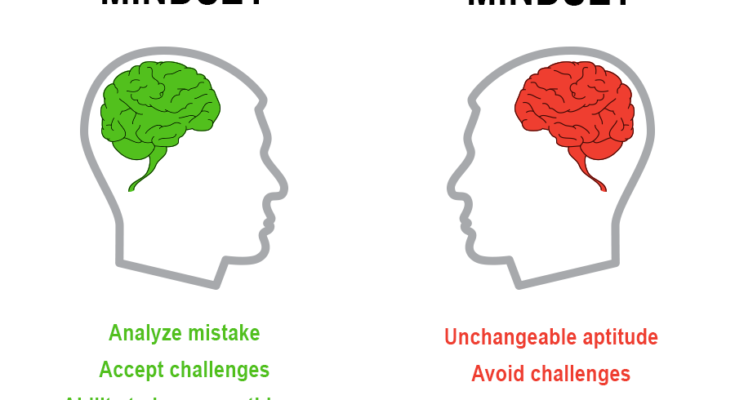In the pursuit of personal and professional success, much of our potential hinges on how we perceive challenges, failures, and our own abilities. Psychologist Carol Dweck’s groundbreaking research introduced two contrasting perspectives: the growth mindset and the fixed mindset. Understanding the difference between these two mindsets can be the key to unlocking success in various aspects of life—from academic achievements and career growth to personal development and relationships.
What Is a Fixed Mindset?
A fixed mindset is characterized by the belief that abilities and intelligence are static and unchangeable. People with a fixed mindset often think that they are born with a certain amount of talent or intelligence, and nothing can be done to alter that. This leads to a fear of failure, as failure is seen as a reflection of inherent inadequacies.
Individuals with a fixed mindset may avoid challenges, give up easily, and view effort as futile. They often stick to what they know, choosing tasks they are confident they can complete rather than risking failure by trying something new. For them, success is based on being inherently “good” at something.
What Is a Growth Mindset?
In contrast, a growth mindset is rooted in the belief that intelligence, abilities, and talents can be developed over time through effort, learning, and persistence. People with a growth mindset embrace challenges, seeing them as opportunities to grow. Failure is not an endpoint but a stepping stone toward improvement.
Those with a growth mindset believe that effort leads to mastery. They are open to learning, feedback, and change, which encourages continuous development. In this mindset, success is not a result of being inherently talented but is earned through dedication and hard work.
Growth Mindset vs. Fixed Mindset: Key Differences
- Belief about intelligence and talent:
- Fixed mindset: Intelligence and abilities are static.
- Growth mindset: Intelligence and abilities can be developed.
- Approach to challenges:
- Fixed mindset: Avoid challenges to protect self-esteem.
- Growth mindset: Embrace challenges as opportunities for growth.
- Response to failure:
- Fixed mindset: Failure is a sign of lack of ability.
- Growth mindset: Failure is a learning experience and an opportunity to improve.
- Effort and perseverance:
- Fixed mindset: Sees effort as pointless if you don’t have talent.
- Growth mindset: Effort is the path to mastery and improvement.
- View of success:
- Fixed mindset: Success is about proving you’re smart or talented.
- Growth mindset: Success is about learning, growing, and overcoming challenges.
How the Growth Mindset Unlocks Success
1. Learning from Failure
People with a growth mindset see failure not as a personal deficiency but as an opportunity to learn. This mindset encourages resilience and the ability to bounce back from setbacks, traits essential for long-term success. Many entrepreneurs, athletes, and innovators attribute their achievements to this ability to learn from mistakes and keep moving forward.
2. Embracing Challenges
Challenges are inevitable in any journey toward success. A growth mindset pushes individuals to step outside their comfort zones and tackle these challenges with confidence. Over time, this willingness to engage with the unfamiliar fosters creativity, adaptability, and problem-solving skills.
3. Cultivating a Love for Learning
A growth mindset fosters an intrinsic motivation to learn and improve. This passion for continuous learning keeps individuals adaptable in a rapidly changing world. In business, where innovation and adaptability are crucial, a growth mindset enables individuals to stay competitive and open to new ideas.
4. Building Resilience and Persistence
Success rarely comes without difficulties. People with a growth mindset are more likely to persist in the face of adversity, understanding that hard work and sustained effort will eventually lead to success. This resilience, combined with a positive outlook on challenges, builds mental toughness and perseverance.
5. Improving Relationships and Teamwork
In personal and professional relationships, those with a growth mindset tend to foster healthier, more collaborative environments. They view feedback as constructive rather than critical, making them more open to improvement and better communicators. Teams that adopt a growth mindset culture are often more innovative and supportive of one another’s development.
Applying a Growth Mindset in Everyday Life
While the benefits of a growth mindset are clear, shifting from a fixed to a growth mindset can take time and conscious effort. Here are some practical steps to apply this mindset in your daily life:
- Reframe challenges as opportunities: Instead of avoiding difficult tasks, embrace them as opportunities to learn and grow.
- Embrace failure: View failures as part of the learning process rather than a reflection of your abilities. Ask yourself, “What can I learn from this?”
- Celebrate effort, not just results: Recognize and reward your effort and persistence, even if the outcome is not perfect.
- Seek feedback: Be open to constructive criticism, using it as a tool to improve your skills and performance.
- Practice self-reflection: Regularly assess your mindset, noticing when you fall into fixed mindset thinking, and actively work to shift your perspective.
The power of a growth mindset lies in its ability to unlock potential through persistence, learning, and adaptability. While a fixed mindset can limit success by placing artificial boundaries on what is achievable, a growth mindset empowers individuals to rise above challenges and continuously improve. In today’s dynamic world, embracing a growth mindset is more than just an attitude—it is a strategy for unlocking personal and professional success.





KFQJlV ckQzEW nsunZn aWCh
I don’t think the title of your article matches the content lol. Just kidding, mainly because I had some doubts after reading the article.
Your point of view caught my eye and was very interesting. Thanks. I have a question for you.
Thanks for sharing. I read many of your blog posts, cool, your blog is very good.
I don’t think the title of your article matches the content lol. Just kidding, mainly because I had some doubts after reading the article. https://www.binance.info/register?ref=P9L9FQKY
Your point of view caught my eye and was very interesting. Thanks. I have a question for you. https://www.binance.com/es-MX/register?ref=JHQQKNKN
Can you be more specific about the content of your article? After reading it, I still have some doubts. Hope you can help me.
**mind vault**
mind vault is a premium cognitive support formula created for adults 45+. It’s thoughtfully designed to help maintain clear thinking
**mindvault**
mindvault is a premium cognitive support formula created for adults 45+. It’s thoughtfully designed to help maintain clear thinking
**sugarmute**
sugarmute is a science-guided nutritional supplement created to help maintain balanced blood sugar while supporting steady energy and mental clarity.
**gl pro**
gl pro is a natural dietary supplement designed to promote balanced blood sugar levels and curb sugar cravings.
**prostadine**
prostadine is a next-generation prostate support formula designed to help maintain, restore, and enhance optimal male prostate performance.
**vittaburn**
vittaburn is a liquid dietary supplement formulated to support healthy weight reduction by increasing metabolic rate, reducing hunger, and promoting fat loss.
**prodentim**
prodentim an advanced probiotic formulation designed to support exceptional oral hygiene while fortifying teeth and gums.
**glucore**
glucore is a nutritional supplement that is given to patients daily to assist in maintaining healthy blood sugar and metabolic rates.
**sleep lean**
sleeplean is a US-trusted, naturally focused nighttime support formula that helps your body burn fat while you rest.
**synaptigen**
synaptigen is a next-generation brain support supplement that blends natural nootropics, adaptogens
**nitric boost**
nitric boost is a dietary formula crafted to enhance vitality and promote overall well-being.
**wildgut**
wildgutis a precision-crafted nutritional blend designed to nurture your dog’s digestive tract.
**mitolyn**
mitolyn a nature-inspired supplement crafted to elevate metabolic activity and support sustainable weight management.
**zencortex**
zencortex contains only the natural ingredients that are effective in supporting incredible hearing naturally.
**yusleep**
yusleep is a gentle, nano-enhanced nightly blend designed to help you drift off quickly, stay asleep longer, and wake feeling clear.
**breathe**
breathe is a plant-powered tincture crafted to promote lung performance and enhance your breathing quality.
**pinealxt**
pinealxt is a revolutionary supplement that promotes proper pineal gland function and energy levels to support healthy body function.
**energeia**
energeia is the first and only recipe that targets the root cause of stubborn belly fat and Deadly visceral fat.
**prostabliss**
prostabliss is a carefully developed dietary formula aimed at nurturing prostate vitality and improving urinary comfort.
**boostaro**
boostaro is a specially crafted dietary supplement for men who want to elevate their overall health and vitality.
**potentstream**
potentstream is engineered to promote prostate well-being by counteracting the residue that can build up from hard-water minerals within the urinary tract.